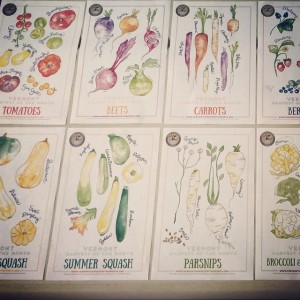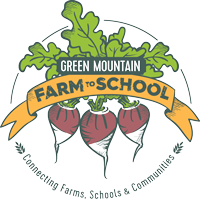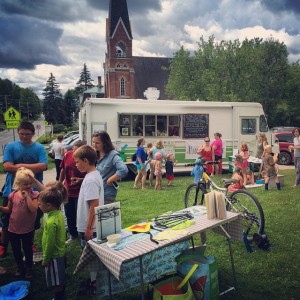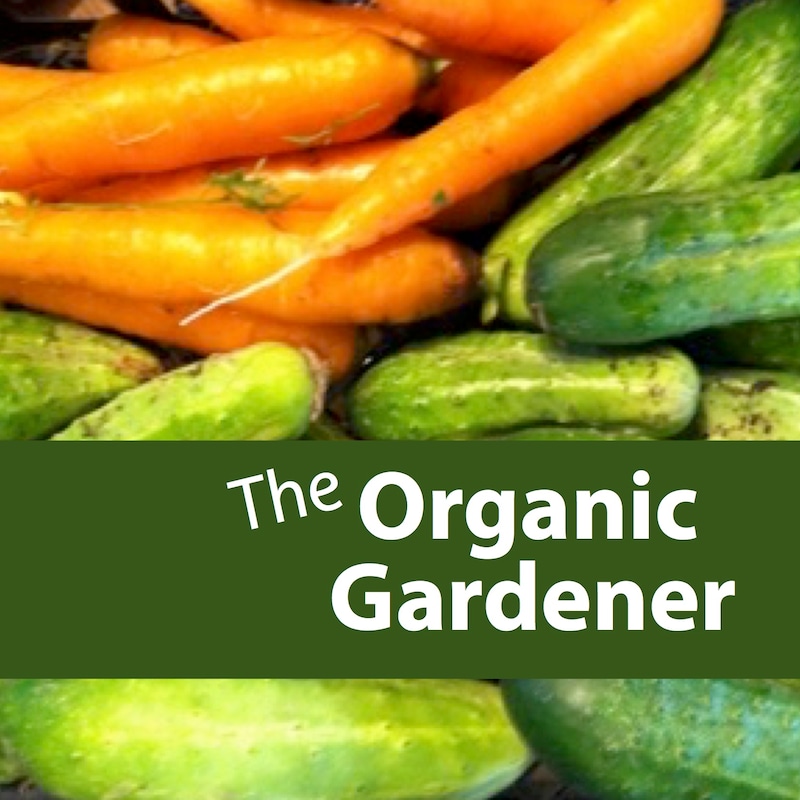
Shownotes
Farm-to-School
Today we’re going to learn about 2 of my passions teaching children and gardening and how to promote healthy eating and gardening in our schools. My guest, Rebecca Mitchell is from the Green Mountain Farm-to-School (GMFTS) who’s mission is to restore and strengthen local food systems in the Northeast Kingdom of Vermont by promoting positive economic and educational relationships among schools, farms, and communities. They create healthy communities by working across the food system with capacity building, resource development, and technical assistance through GMFTS’ school gardens, Farm-to-School Program, food hub, food truck, and statewide marketing campaign.
Tell us a little about yourself.
My name is Rebecca, Becca Mitchell, I grew up in Burlington VT, and for the last 2 1/2 years I’ve been working and living in the NE Kingdom. That’s the 3 NE counties in the state of Vermont up by the Canadian Border. I have a background in Environmental Science and got into education working as support staff working at a pre-school when I was a college student from there my path led me to farm-based education which led to Farm-to-School programing. Working with mostly elementary aged school children, connecting them to where their food comes from, through hands-on learning experiences, mostly cooking, gardening, and all kinds of things like that.
Tell me about your first gardening experience?
Yeah! I love that question! I was born in Allentown, PA which is more of an urban area then VT. I remember having a small garden in our backyard. I lived with my parents and grandparents. I remember tomatoes predominately and loving eating fresh tomatoes from the yard, and being fascinated by that growing process. So my family created a little garden plot for me, where I got to tinker with planting seeds and trying to grow things. It wasn’t super successful because I was pretty young at that point but it was nice to be able to get outside attempt to grow some things and play in the dirt. My interests have continued to grow and my knowledge of gardening has expanded there as well.
Environmental Science/Studies Degree
Tell us a little about becoming an Environmental Science Major. Because I had a guest Neva Hassanien, on from UMT and I was telling here when I first came to Montana and when I went to school I didn’t even know that was major.
So, I went to a pretty small lib arts school Moravian College in Eastern PA. Part of the curriculum there is really just taking classes though a broad range of disciplines. My freshman year I took an intro to Environmental Studies course, and had a really wonderful professor there, and as an intro course it had a broad overview of Environmental issues so I was inspired by that. One of the beauties of liberal arts education is it’s pretty fluid so I wasn’t locked into a major at that point. I went into school undecided, actually leaning towards more of an English degree, but I really ended up loving EVST and sciences, so pursued that and had a lot of really wonderful opportunities in school to have hands-on experiential learning.
I did an undergraduate research project my junior year of school, studying stream ecology, so catching fish and macro invertebrate. Studying water chemistry as well as doing an internship at a hydroelectric facility my senior year. I had a wonderful group of professors and advisors who made following the path to EV science easy and exciting for me. This has been a little bit of a step going from those water based sciences to gardening and food education its a path that made sense to me. I think the background I got in school has aided me in the work
I get so frustrated with kids who say I don’t want to college because I don’t know what I want to be but I think a lot of college is figuring that out and I think it’s so interesting you went form being an english major to being a science major and water chemistry. It really shows you, that you learn so much about what you want to do, there’s all these jobs you never heard of your sitting next to someone who’s like yeah my cousins’ best friends niece does this you’d love it. And the next thing you know it your doing something you didn’t even know existed!
What does organic gardening/earth friendly mean to you?
Yeah! I think organic gardening or your term friendly gardening is being conscientious about gardening practices. As an organization we do a lot of school gardens, obviously they aren’t certified organic but we generally follow organic practices and just staying with your roots and being respectful and gentle to the earth. Especially when you’re working with kids there’s no need for chemicals to go into the gardens where we’re working.
What are some of the things you plant with the kids. Tell us about the schools
NE Kingdom makes it sound super swanky and exciting, and it is beautiful! It’s the rural northern part of the state.
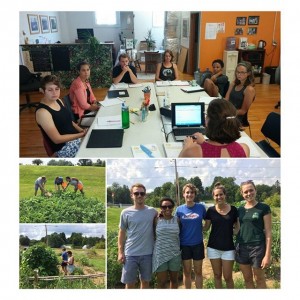
So our program works with about 25 schools in the area, facilitating their schools gardens. That program can vary. In some of the schools it is after school where we work with a small group of kids in the garden. For other schools it’s all kids all classes who are involved in that gardening process. Generally we have our pool of Americorps members who are generally the boots on the ground facilitating those gardens.. That’s what I did for the past 2 years, now I’m in a staff position with the organization which is a little bit different.
Basically you’re assigned to 3-4 different schools, and you’re responsible for going out in the fall, harvesting with the kids, washing the food, weighing it, bringing it to school kitchen, service staff. That can be integrated into school lunches or a community dinner during the school’s fall open house. Kids are really getting to see a holistic prices there.
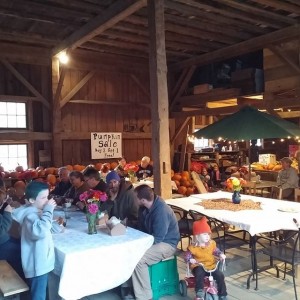
Then in the spring students get to do seed starting, planning what the garden looks like, then physically prepping the beds. So lots of dirty hands, lots of excitement in the garden!
So my big question that has always made me wonder as a teacher, is what do you do during the summer, when school is out? How does that piece work?
Totally. Our hope is always to have parents, families, community volunteers coming out to help tend the garden during the summer. The interest varies with the town. We try to make the garden a community resource that is accessible where they can come do a little bit of weeding and a little bit of watering, hopefully getting the students and parents ownership over the garden.
Keeping in mind, things happen, people aren’t always able to come out. So we make it a point to make sure the staff visits the gardens regularly during the summer, to help tending the beds, harvesting, weeding, watering, all those good things. I think it’s an ongoing process to get those pools of volunteers built up for the garden.
How do you get funded?
We have funding through a number of different outlets. We have a couple of programs different from our actual in school programs. But we get a lot of grant funding, donations from both corporations and individuals. It varies, and my supervisor would be able to better to explain the nitty gritty details of where funding comes from.
For in school programs, I think we do ask schools to pay a modest yearly fee, to cover cost of mileage, and time to come in to supply and activities. I’ve heard from schools it’s a pretty modest fee in comparison to other things they have built into their budgets.
How big is your area if you’re covering that big of an area?
NE Kingdom is 3 counties. A lot of our schools are in the middle areas there, which is Orleans County. Newport where our office is located is in that county so lot of schools are there, some in the surrounding counties of Essex and Caledonia. They’re pretty spread out doing a lot our Farm-to-School coordinators do a lot of driving over the course of the year to visit all of those sites.
But like 50 mile radius or 100 or 200 miles?
Probably 50 miles.
So tell us what kind of things you plant with the kids?
What have a list of certain crops that are kind of universal across all of our school gardens and then beyond that there’s flexibility, depending on what the food service director is interested in having in their garden, what the kids are passionate about planting! In general we always plant in fall:
- garlic
In the spring we plant:
- kale
- winter squash
- tomatoes
- carrots
- beets
- potatoes
I think there’s a list of about 10 crops we always plant. Kind of keeping in mind you don’t want to plant all tomatoes and then have blight come and wipe out your entire school garden so thinking about diversity of crops. Different texture, different colors, making the gardens aesthetically interesting. Different growing timelines, so we’ll have radishes in the garden, they grow pretty rapidly so that’s a little more exciting and the kids can actually see things coming through a little more quickly!
There’s a lot of consideration in what we plant in the gardens, I think that list has been developed over the course of the devon or eight years the program has been in place. We also want to keep in mind the school cooks if they are the ones utilizing what we are harvesting from the garden, we definitely want their input about what goes into the garden so if they are really passionate about broccoli or something else we always want to make sure we have that covered in the garden so we actually see what gets harvested in school meals.
How does someone get started, or get schools involved if someone is interested in getting a Farm-to-School program in their community?
Once I started with the organization, we had a lot of schools, our pool of participants has been built up over the last years, but we definitely have other schools who are interested in programing want to sign on, and don’t really know where to start, but I think coming from the organizational standpoint and getting a school signed on.
I think garden-based education, and farm-based education can cover a lot of subjects, it’s experimental learning which I am a big advocate for. There’s science involved, mathematics involved, you can integrate history really readily. So I think the resources and a little bit of start up can take some time, but once you have a garden established or even a small plot, I think the benefits are really apparent. So trying to get schools on board with things, it’s a pretty easy sell, in my opinion!
And also perhaps coming from Vermont is a state that has a has a lot of momentum behind the Farm-to-School movement. So there’s a lot of demand for this kind of programing up here, which may not be the case in other parts of the country. But I think our organization is working in the northeastern part of the state and we have a lot of regional organizations around VT doing similar work in the communities. Yeah! I just see a lot of benefits to the programing, I think as long as the schools are willing to invest a little bit of time and money in the beginning there are a lot of awards. It’s relatively easy to get a parent or volunteer to spearhead those initiatives, all it takes is one passionate individual to get things started.
Farm-to-School Movement
What else would you like to talk about?
I would love to touch base about some of our other programing really quickly. Our organization is Green Mountain F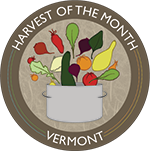 arm-to-School roots are in the Farm-to-School movement and connecting kids to food and gardens and farms, but we do have a lot of other great initiatives that are interconnected. I’m involved with them, mention them really quickly.
arm-to-School roots are in the Farm-to-School movement and connecting kids to food and gardens and farms, but we do have a lot of other great initiatives that are interconnected. I’m involved with them, mention them really quickly.
We have a statewide campaign the Vermont Harvest of the Month, that highlights a local in season fruit or vegetable each month that provides educational materials for schools and other institutions to utilize.
We have the Lunchbox which is our Food truck and summer service program.
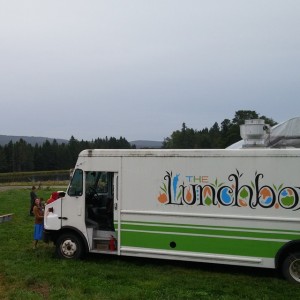
Each summer we have 10 weeks of free meals for kids, we try to source as many ingredients locally as possible. WE also have a food hub called Farm Direct, helping retailers like schools and hospitals and other institutions procure local foods. For the schools might be getting 150 lbs of produce out of your school garden on any given year, but if you want to supplement that thorough out the year with other local produce we help make that possible.
The Farm-to-School is the backbone of our organization but we have a lot of other exciting initiatives to promote local food in our communities.
That’s awesome because I think one of the barriers to starting a garden or farm is where are you going to market your produce so you’re kind of helping not just the kids at school, but also the local farmers.
Yes it’s a mutually beneficial process.We’re seeing our kids, getting excited about vegetables and we’re seeing local foods in their cafeteria. And we’er seeing farmers down the road, are also getting that economic boost of those additional sales and it creates extra markets to sell their products! IT’s really awesome and something that I’m excited to be a part of!
Are there any tips you could give farmers or gardeners if they want to become one of your producers. Are the a list of requirements they have to follow?
I think we do have some guidelines, we have a staff member who’s responsibility who’s coordinates our food hubs. We have a set of producers, but sometimes we have farmers call who say this is what I am growing? Or I have an excess of this crop? Do you have the flexibility to sell it?
So you don’t know till you ask? We’re lucky to have the food hub as a resource in this area. If there are farmers in the other parts of the country it’s great to make that connection because even if things don’w work out right away making those connections down the line, if the food hub needs winter squash and then they;ll call your farm, so making your connections never hurts!
I’ve always thought that a business could be made form just supplying carrots or potatoes to the schools would keep a person busy, and they’re easy to store, I’ve just been trying to figure that piece out.
